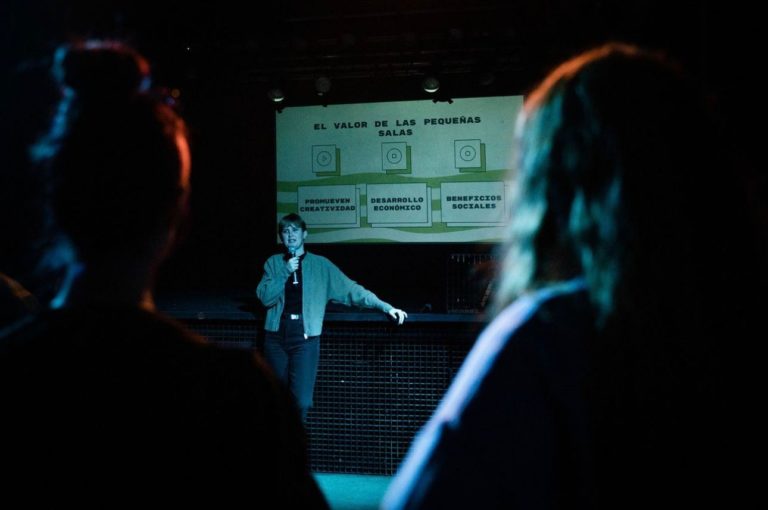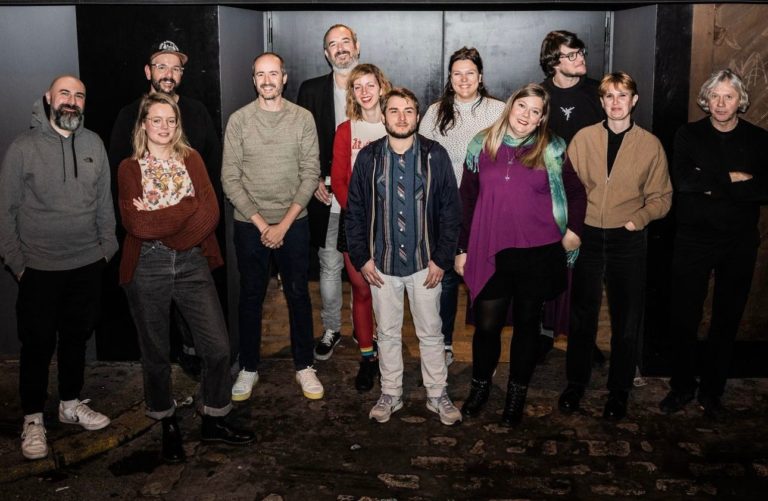Author: Esteban Ruiz Sánchez
It seems longer, but it has only been three years since we saw our world disrupted by Covid and it all starting to shape-shift into the music scene we have today, a hyper-dynamic sector with countless faces to it, with exciting new ways of doing business and so much potential to thrive and prosper. A brand-new, super technological ecosystem bloomed after the darkest hours; more diverse, more inclusive, more equal, and able to deliver means for every individual to pursue happiness through music, if that is their wish. Only, really?

I am Dive live at Sala X in Seville, Spain, in November 2023 – © Ángel Berbnabeu
A contrasted sector
We can all agree on the fact that we are living an amazing musical moment in Europe: so many emerging artists, so much diversity. True, but we can see some hovering sombre facts from down here to counter that simplistic conception of the idealised music scene that seems to be generally accepted nowadays.
We have come to terms with the fact that we live in a fiercely liberal society and the music sector is part of it. The music middle class has been really struggling ever since the physical record sales dropped due to downloads, and things never improved. Covid was a disruption deep enough to accelerate a new change of paradigm leading to a much darker scenario in the music sector, but even more so for the emerging ranks of music innovators. Also, let’s not be naïve, we are quite simply drifting into a corporate music scene, where it is now normal to see investment funds and international holdings becoming heavy players in the music industry, and prefab, mainstream acts increasingly infiltrating the independent scene; and we must ask ourselves a very serious question: what does this mean for our cultural diversity down the line?
Yes, this may look like a vague problem and the overwhelming volume of the issue can make it hard to seize the facts and tackle concrete problems, but there are clear warning signs like sky-rocketing prices of live music, bottom plunging revenue for most of the creators or how some younger artists are gravitating towards a system of fake, intangible validation for their work, where the goal is not making awesome music or being great artists anymore but becoming “influencers,” among an endless list of worrying signs.
And, of course, it is normal to not always navigate these waters successfully, it is just too complex sometimes to connect the dots and get a whole, comprehensive view of the struggle in the music business for the independents these days. However, we are not powerless. We are not fully subjected to the power moves and the impositions of the neoliberal forces at play here. We can choose not to surrender and work our ways around from our scopes of influence, to counter the rolling wave crushing real cultural diversity, social inclusion, and representation by seizing the networking and collaboration opportunities that our hyperconnected reality offers nowadays, and start knitting our safety net, which I believe needs three main threads to expand from: local networks, capacity building strategies, and kindness.

Erica R. Pender (Rockrnolla Producciones), while speaking about the relevance of small venue collaboration during the final Scenergies IRL event at Sala X in Seville, Spain – © Ángel Berbnabeu
Connecting and evolving: the cruciality of networks
Understanding the extreme importance of local, inclusive, collaborative ecosystems as knots in a wider network is key in the process of countering globalisation dynamics. We have all taken for granted that globalisation is unstoppable and, however that might be true to some extent, we must not neglect our responsibility to our immediate contexts, and we can do a lot from the local perspective, focusing on peripheral territories, rural areas, and underrepresented collectives. In the end, it is up to us to balance the scales of opportunity and access to the resources as much as we possibly can.
Moreover, training and capacity building strategies are paramount. One of the heaviest dragging factors for the emerging music innovators is the lack of in-depth knowledge of the business. We may not like to admit it, but we renounce control and leadership of our own professional music journeys mostly because we lack the know-how, the support and the financial capacity to take the wheel and embark in the process as realistic entrepreneurs, which in the end becomes a strategic weakness of the independent sector.
The impacts of neoliberal dynamics on the independent sector are also clearly showing here, because pursuing a fruitful music career has become a matter of either immediate turnover and return on the investment, or nothing. A tricky situation when the trap for the new incomers is built upon a compromised idea of validation and return on the investment, and many young creators are considering virality, popularity on social media and, in the end smoke and mirrors, the ultimate goal to be achieved in a career that seems to aim for either utter fame or failure, with no middle grounds. Becoming famous or nothing, giving up. We must disrupt these processes through education, mentoring, support, and capacity building. Independent music professionals need to understand that we are co-dependent and investing time and effort in helping a younger, more diverse, and better prepared population of new professionals enter the independent sector is key and vital for our very own survival.
This is the motivation behind the efforts of Rocknrolla Producciones, an independent Sevillian music promoter, which tries to compile its philosophy and ideas as a company into a series of projects and proposals, some of which have successfully been pitched to different governments and institutions in the recent years. Among others, the organisation was granted funding by the European Commission to implement two projects that really encapsulate these needs to train and gather independents: TransEuropeCREATE! (TEC!) and Scenergies. On the one hand, with TEC!, Rocknrolla Producciones designed an online campus for twenty-five emerging, independent artists from seventeen countries and provided an online ecosystem where they could co-create and co-produce music and received an intensive capacity building, training, and mentoring programme imparted by active, independent music industry professionals–among them Rocknrolla Producciones’ two partners, Westside Music from Gothenburg, Sweden, and Estragon Club from Bologna, Italy. On the other hand, the Scenergies project allowed to create a scheme for good practice exchange and network platform for the sustainability and progress of small music venues in Europe. 4 venues were brought together for this project; Mochvara in Zagreb, 4AD Muziek Club in Diskmuide, Le Grand Mix in Tourcoing, and MKZ in Skopje, together with Rocknrolla’s venue, Sala X in Sevilla. The network is now growing, and the partnerships are expanding for further projects and opportunities.

Team members of the Scenergies project meet in Sala X in Seville, Spain, for the final Scenergies IRL event. The team is formed by staff members of Le Grand Mix (France), Močvara (Croatia), MKZ (North Macedonia), 4AD (Belgium), and Sala X (Spain) – © Ángel Berbnabeu
Changing mindset: reconsidering kindness
But if we want to knit this network for good and on solid foundations, we must address another looming issue, the lack of kindness and how ultra-competitiveness is spreading across our sector. We deal in emotions and hopes in the cultural and music business. No matter if we are recording artists or managers, record labels, festival promoters, or high-ranking decision makers, we must always remember we are the gateways into the music sector for the younger artists, and that our whole ecosystem depends on human beings expressing their sadness, happiness, broken hearts, and anger through songs, not knowing a thing about the business yet; and that they are the ones we need to help, train, educate, nurture, and foster. We can do more to counter this reigning dehumanisation and to make the younger artists and organisations see that one can be happy and thrive in music without needing to mindlessly bow to some multinational company that is only interested in maximising profits and overthrowing their competition. To be very clear, it isn’t about considering that cost efficiency and profit, or competition, must be left out of the equation for the independent sector; what is implied is that happiness, wealth, and popularity are not synonyms and that we must convey the message with common sense and honesty, dismantling the generally accepted concept of success in music.
That last idea was really present when WeAreWolves Records was founded, ten years ago. We wanted to help younger acts from Spanish peripheries to become leaders of their own projects, without needing people from Madrid or Barcelona telling them how to run their organisations and plans. The most important strategy we follow with the bands we sign is to transfer what we have learned as independent musicians–notably at I am Dive within the last twelve years–as well as support and foster them to learn the craft and the ropes of the business. WeAreWolves Records is an independent, humble music project, but it is all about being sustainable, happy, and honest; we like to think that we can collaborate in delivering countering visions on what being successful looks like and spread a message of patience, work ethic, and common sense. The label was born to give legal coverage to our operation as I am Dive in the process of reclaiming ownership and gaining leadership of our own music project, now we release the works of five bands and just became the first Spanish record label ever signed by Rough Trade Distribution, Germany's largest independent music distributor.
Being an independent musician, running a tiny independent record label, and working for an independent music event promoter in Seville–a not so big city in Southern Spain closer to Morocco than to Madrid–, makes me, by all means, aware of what it is to live in a peripheral European territory, while still believing that we can help improving the local music scene and hopefully bringing value to the grand scheme of culture at a European level. Indeed, the value that we, creators and innovators from the border lands, can bring into the European cultural narrative is huge in comparison to the level of access we get to opportunity and resources.
Our independent experience and mindset give us the responsibility to widen and strengthen collaborative schemes, to constantly exchange ideas and good practices, to foster peer-learning and capacity building strategies, and to always keep an eye out for those who want to enter the sector and join us as independent agents and organisations. Our networking potential may very well be the most effective tool to counter the growing overrepresentation of big corporations and investment funds in music, and the subsequent growing threats for the independent music sector: less diversity, less representativeness, less opportunity for the upcoming talent, and a less just and resilient independent sector. Let’s not do it alone.
Published on May 7th, 2024
About the author:
Esteban Ruiz Sánchez, Seville-based musician of the band I am Dive, co-founder of the label WeAreWolves Records, and Lead Project Manager at Rocknrolla Producciones.